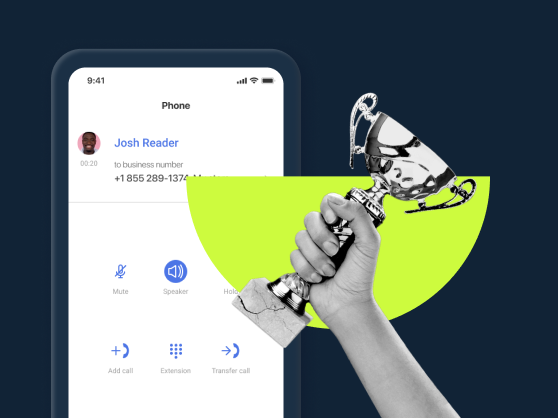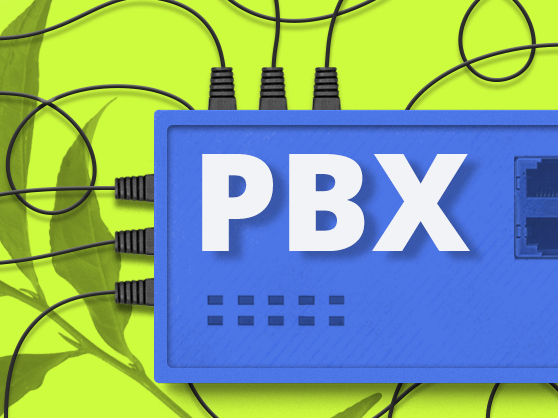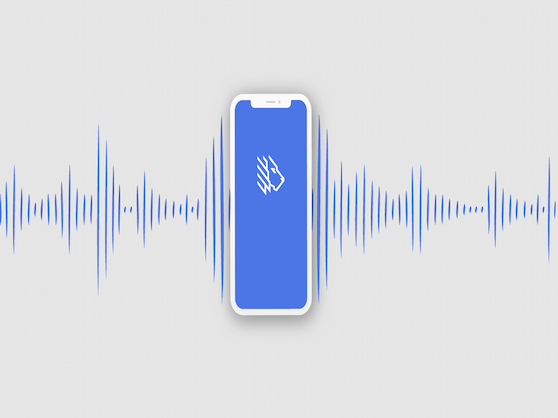Both individuals and businesses turn to call recording for reasons like record keeping, court evidence, and customer service. Yet we also wonder: can you legally record a phone call in the USA and Canada? While unsolicited call recording is usually illegal, in most states it’s lawful to record phone calls as long as you comply with federal and local laws.
In the U.S. and Canada, call recording is acceptable in both business and personal contexts. Call recording laws vary across country and state borders but are simple to follow once you know them. Scroll down for your one-stop guide to answering the question – “Is it illegal to record a phone call?” – for good!
Call recording laws in the USA
In the USA, any illegal recording of calls that doesn’t comply with federal and state laws is considered wiretapping and illegal eavesdropping. Either one-party or all-party consent (if it’s a call with multiple people) plays a vital role in U.S. recording laws.
The FCC defines two-party consent as the following:
- Playing a pre-recorded message before the call (e.g.: your call is being recorded [for X purposes])
- Notifying all parties verbally or in written form
- Playing an audible beep tone at set intervals during the call
Federal Law
U.S. Federal law on recording conversations (18 U.S. Code § 2511: “Interception and disclosure of wire, oral, or electronic communications”) states that one-party consent is required to legally record.The person recording the call must be either a participant of the conversation themselves or obtain permission from at least one party. Recordings made with criminal intent are also prohibited. Moreover, illegal recordings have no power in court.
State Law
Most states in the USA are aligned with federal law – they require the consent of only one party for recording phone calls. However, some state laws have regulations that demand mutual consent.
What is one-party consent? List of One-Party Consent States
One-party consent is the legal term used to describe call recording regulations. This means that the consent of any party (i.e.side) involved in the conversation is enough to make the call recording legal. The other side cannot sue you for recording the call, and you can use such recordings as evidence in court.
States with one-party consent laws:
| Alabama | Kentucky | Ohio |
| Alaska | Louisiana | Oklahoma |
| Arizona | Maine | Rhode Island |
| Arkansas | Minnesota | South carolina |
| Colorado | Mississippi | South Dakota |
| District of Columbia | Missouri | Tennessee |
| Georgia | Nebraska | Texas |
| Hawaii | New Jersey | Utah |
| Idaho | New Mexico | Virginia |
| Indiana | New York | West Virginia |
| Iowa | North Carolina | Wisconsin |
| Kansas | North Dakota | Wyoming |
What is two-party consent? List of All-Party Consent States
Two-party consent is the term used to describe call recording regulations. This means that the consent of two parties (sides) involved in the call is necessary. If it’s a conference call, you will need all-party consent. Should you record conversations without consent, wiretapping laws allow the other party to sue you for violations. Moreover, you cannot use tape recordings obtained illegally as evidence in court.
States with two-party laws:
| California | Maryland | New Hampshire |
| Connecticut | Massachusetts | Oregon |
| Delaware | Michigan | Pennsylvania |
| Florida | Montana | Vermont |
| Illinois | Nevada | Washington |
Recording phone calls across state lines
If state regulations are clear enough, what consent law for recording conversations should you follow with interstate phone calls? For example, you have a business located in New York but with many clients (and thus, callers) from Pennsylvania. Since these neighboring states have different recording laws – NY is a one-party consent state while PA is an all-party consent state – which road should you take?
As a rule of thumb, recording interstate phone calls requires two-party consent. In the above example, regardless of where your business is located, you’ll need to respect PA’s two-party laws and notify all parties about the call recording. How exactly do you do that? We’ll show you below.
Call recording laws in Canada
Recording calls in Canada is subject to the federal private sector privacy law, otherwise known as the Personal Information Protection and Electronic Documents Act (PIPEDA). The Office of the Privacy Commissioner of Canada specifies three ways of gaining consent for recording business calls:
- Verbally notify everyone involved in the conversation about the recording and its purpose (e.g.: your call is being recorded for X purposes). Use the recordings only for the specified purposes.
- Have a customer press a number on the keypad after an automated message (e.g.: press 1 to continue with the call)
- Notify the callers in written form via written statements (e.g.: if you have any questions, please call…. Your call will be recorded for X purposes)
When it comes to recording personal phone calls, Canada has adopted one-party consent which means you can record a conversation that you’re taking part in without knowledge of the other party. The recordings may be used as evidence in court.
Penalty for Violating Call Recording Laws
In both the USA and Canada, it’s illegal to record a phone call without the consent from the involved parties will result in federal and/or state charges and litigation costs.
In the U.S., wiretapping charges vary based on state and range from misdemeanor to felony. The former implies fines and/or up to 1 year imprisonment while a felony implies fines and 1-5 years of imprisonment. Moreover, violating recording laws will result in lawsuit expenses.
In Canada, under Section 184 of the Criminal Code, it’s illegal to secretly record calls without the consent of at least one party. Wiretapping is subject to up to 5 years of imprisonment. For organizations, violating wiretapping laws involves fines and imprisonment.
To avoid trouble in all states, use the rules above to obtain the consent of all parties before recording- including the participants and the third party listening to the call. Should you hesitate about the legality of recording a conversation, contact your local attorney.
What About Recording Police Officers and Public Officials?
These regulations are subject to regional U.S. Court of Appeals regulations. Under the First Amendment, the legality of recording phone calls to/from public officials is a constitutional right and may prevail over federal and state laws. Several (but not all) U.S. Courts of Appeals have recognized this right.
Tips for Recording Phone Conversations
Prepare your environment in advance
Turn off background TVs, mute loud notifications and phone calls, make sure that people (and pets) aren’t interfering. If the call is important for further analytics, make sure your recording device is working and the recorded audio is of good quality.
Tell all parties about the call recording
Set up an automated greeting notifying all parties to a conversation about the call recording. This will automatically ensure wiretapping laws are observed. This also takes away the burden of telling the other party about the recording in your own words, which leads to uncomfortable questions.
Clearly state the purpose of the recording
Reasons for a business to monitor telephone conversations include: quality assurance, customer service, training purposes. For example, your message can state: “Thank you for calling X company. This call may be monitored or recorded for quality assurance and training purposes.”
Identify all the participants of the call
Introducing everyone “around the table” isn’t just good etiquette. If you plan on analyzing recordings of the phone call or conversation later (we’ll tell you how below), naming all the parties is necessary for keeping records and organizing data.
Be honest about the recording
Some people want to ensure a confidential conversation or feel concerned about their privacy when they hear about a call being recorded. Be prepared to answer legal questions your callers may have, such as what potentially private data you’re collecting, how you’re using it, and whether the information acquired in the phone conversation is private property or will be shared with third parties.
Improve speaking habits
Most of us don’t mind how we talk “in real life”, but cringe at how our voice sounds on recordings. In recorded conversations, monitor and improve habits such as articulation and speech. You’ll thank yourself more than once – especially if you plan on using voice to text transcription.
Avoid snacking
If you’re taking calls all day, an innocent snack may seem fine – especially if you think your mic is off (and it’s not). By all means, snacking isn’t illegal, but do skip the food and drinks if your telephone conversations are being monitored or recorded!
Mute your mic when not in use
This one is for calls held via a softphone, computer app, and on conference calls. When not speaking, mute your mic and ask the other parties to do the same. Otherwise, your computer (or phone) microphone will pick up the audio output from all the participants’ mics and echo it back.
Which Phone Calls Should Be Recorded?
Recording meetings with clients
Clients can provide useful feedback for developing or adapting your product or service to market needs. Always record meetings with clients and digitally organize them in a single folder for further review. Ensure the consent of all parties to avoid confrontations.
Recording conference calls
Keeping the records regarding conference calls may help discover missed insights, identify points for further discussions, or explore opinions with other members of the team or with management at a later time. Inform each party to the conversation about your intentions.
Recording interviews
Recording is a great help in both job interviews and journalist interviews. With the former it helps HR consult with managers and more fully evaluate the candidate; with the latter, recording is invaluable for direct quotes and insights. Sometimes journalists opt for the secret recording of conversations, but keep in mind that this may result in loss of confidence from the source and even lawsuits.
Recording customer service calls
With customer service, recording calls is best done via automatic call recording that’s part of the business’ phone system (see below). Storing and analyzing such recordings while respecting phone recording laws by state improves customer experience and helps collect feedback, train personnel, and evaluate their work.
Recording sales calls
Just like customer service, sales phone calls should be recorded automatically. Transcribing and monitoring your sales calls will help improve retention, evaluate employee behavior and train new team members on sales teams.
Recording customer interviews/discovery calls
Customer interviews are part of the feedback loop which keeps companies growing in the direction aligned with its audience. Since these calls are incredibly valuable for product departments, always record, transcribe, and securely store such interviews.
How to Record a Phone Conversation
When recording calls, companies and individuals have two options: manual call recording apps or call recording built into your phone system. MightyCall’s business phone system has built-in automatic call recording so you don’t have to wonder how to record calls and what apps to use.
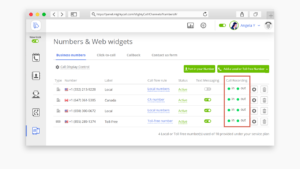
Call recording with MightyCall is hands-free in the full sense of the word. It works on calls made to/from all connected devices, including MightyCall’s iOS/Android mobile app.
How it works:
- MightyCall’s Call Recording feature is automatically enabled on all of your phone numbers connected to our phone system. You can adjust this option (including whether you want it on incoming/outgoing calls or both) on the Numbers & Web Widgets page of your profile.
- When the Call Recording option is enabled, you automatically give consent to record the conversation on your end. Your callers will hear the automated verbal announcement: “This call may be recorded for quality assurance” when call recording has been initiated. By continuing, they give their implicit consent to legally record the call.
- When you record calls through MightyCall, you may later listen to, organize, and analyze them in a section of your MightyCall profile called Journal in both the web version and mobile app.
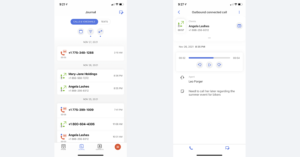
Analyzing Recorded Phone Calls
Recording business phone calls isn’t just useful for salespeople and large companies. Small businesses can use call recording for a multitude of purposes, such as:
- Improving customer experience – recording a conversation with customers and later analyzing it, so you can see the flaws in customer service easily and apply targeted changes
- Evaluating your employees and teams – managers and business owners can evaluate their employees’ phone etiquette and give appropriate feedback. It’s important to mind recording laws by state when recording internal company processes as well.
- Defining marketing strategies – by listening to your customers’ reaction to different marketing campaigns, a small business can swiftly make necessary changes to the business plan
- Gathering feedback – listening and carefully applying customer feedback is the ideal tool for improving your product and service.
- Keeping official records – easily settle complaints from customers, including legal disputes, by recording a conversation.
MightyCall offers analytics built right into the business phone system. Group recordings by date, caller, or length and easily get back to specific recordings or archive them. For example, you may organize and review calls from a customer or analyze issues and complaints that took a longer time to solve.
The Takeaway: Record Keeping is Priceless, Consent Isn’t an Option
- Respect laws on recording conversations. Never record a business, personal, or confidential conversation without the consent of at least one participant of the call. Optimally, obtain the consent of all parties.
- For business purposes, play a pre-recorded message notifying all parties about the call recording and its purpose. Choose a business phone system where this feature is automatic.
- If the audio recording will be later transcribed or evaluated, prepare your environment in advance to shut out background noises
- Securely store audio and/or transcribed files in the Cloud or on your computer for further analytics









